A child of the 50’s, cars have long fascinated Stephen King. There’s Billy Nolan’s ‘61 Biscayne in Carrie, Jack Torrance’s clapped-out 1968 Volkswagen in The Shining, the sentient trucks of Maximum Overdrive, Cujo’s Pinto/hotbox, the killer station wagon in Mile 81, the extraterrestrial Buick Roadmaster in From a Buick 8, and the car crash that launches the plot of Misery. Cars are a part of King’s all-American palette along with denim, rock‘n’roll, and acne, so everyone expected that it was only a matter of time before a car headlined a Stephen King book. But when the book came out, everything about it was unexpected. Its deal was unusual, its setting was different, and even its quality came as a surprise. Rambling, sloppy, boring, and bloated, Christine is the book that lived up to every accusation ever leveled at King by his detractors.
The idea for Christine was hatched back in 1978 when King was walking home one day and thinking about his dying Pinto. If King had to pay royalties for inspiration, this Pinto, which he bought with the hardcover advance for Carrie, would have earned a mint by now since it also provided the intial spark for Cujo. But in 1978 his Pinto wasn’t inspiring novels, just short stories. “Wouldn’t it be funny,” King remembers thinking, “if the little numbers on the odometer started to run backwards, and that when they ran backwards the car would get younger? That would make a funny short story.” Then the 80’s happened.
Maybe it was because the 80’s were an era of out-sized excess, maybe it was because King was snorting massive quantities of cocaine and downing gallons of beer every day, maybe it was because fewer and fewer editors could tell this 10,000 pound gorilla what to cut, but before long his cute car idea was bigger than a short story, bigger than a novella, bigger even than King’s other novels. By the time it was finished, Christine would be King’s longest novel to date, after The Stand, clocking in at a whopping 526 pages.
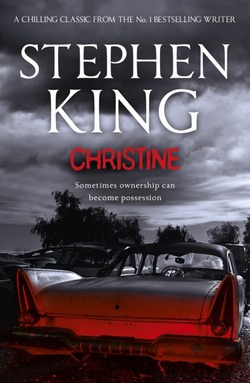 Published in 1983, the book sold 303,000 copies in its first year and King saw an awful lot of that money. Previously, he had accepted an advance from New American Library for his books, but he had become frustrated with the payment schedule. Most publishing contracts see writers paid in thirds or in quarters, meaning that they receive a quarter of their advance on signing the contract, a quarter on acceptance of the manuscript, a quarter on publication, and a quarter six months after publication. It’s only after paying off this advance that the publisher owes royalties. King’s books sold so quickly that he was usually owed royalties before his final advance payment was due, but his publishers weren’t obligated to give him his super-sized royalty check before they finished paying him his smaller advance. For Christine, King offered them a new deal: he’d take a $1 advance and a bigger share of the royalties. That way, the second a copy sold he’d be earning his royalties. It’s rare that an author can dictate terms like this, but it’s a sign of his power that both publishers rapidly agreed.
Published in 1983, the book sold 303,000 copies in its first year and King saw an awful lot of that money. Previously, he had accepted an advance from New American Library for his books, but he had become frustrated with the payment schedule. Most publishing contracts see writers paid in thirds or in quarters, meaning that they receive a quarter of their advance on signing the contract, a quarter on acceptance of the manuscript, a quarter on publication, and a quarter six months after publication. It’s only after paying off this advance that the publisher owes royalties. King’s books sold so quickly that he was usually owed royalties before his final advance payment was due, but his publishers weren’t obligated to give him his super-sized royalty check before they finished paying him his smaller advance. For Christine, King offered them a new deal: he’d take a $1 advance and a bigger share of the royalties. That way, the second a copy sold he’d be earning his royalties. It’s rare that an author can dictate terms like this, but it’s a sign of his power that both publishers rapidly agreed.
Set in Pittsburgh instead of Maine, Christine wasn’t just unusual for its location or the terms of its contract, it was also unusual because it was the first book in which King became everything people accused him of being. Cujo may be famous as the book Stephen King wrote in a drunken blackout, but it’s Christine that really feels like the work of a drunk: repetitive, bloated, clumsy, and half-baked, it’s King at his most unstoppable, his most uneditable, and his most vainglorious. Where does the super-rich author sit? Wherever he wants.
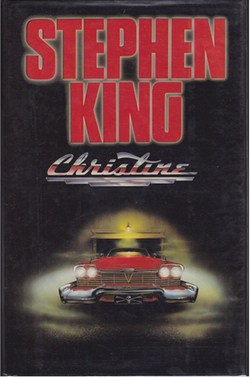 The book itself is relatively straightforward. Arnie Cunningham is a nerd with bad skin who’s a mechanical whiz, but his middle class parents are embarrassed by his passion for working on cars, envisioning him instead on a Chess-Club-to-valedictorian-to-Ivy-League-College track. His friend Dennis, who (mostly) narrates the book, is their school’s star football hero and Arnie’s best friend. One day Arnie spots Christine, a rusted-out 1958 Plymouth Fury, for sale and he impulsively buys it, much to Dennis’s and his parent’s horror. He lovingly restores it, becoming more and more obsessed with the car while simultaneously pulling away from his parents, Dennis, and even his girlfriend, Leigh. Bullies and people who get in his way are run over by the driverless Christine when Arnie is out of town, and the whole thing ends with Dennis renting a truck and smashing Christine into little bits. Oh, there’s also a subplot about cigarette smuggling that takes up about 100 pages, and Dennis spends the entire middle of the book in a body cast in the hospital.
The book itself is relatively straightforward. Arnie Cunningham is a nerd with bad skin who’s a mechanical whiz, but his middle class parents are embarrassed by his passion for working on cars, envisioning him instead on a Chess-Club-to-valedictorian-to-Ivy-League-College track. His friend Dennis, who (mostly) narrates the book, is their school’s star football hero and Arnie’s best friend. One day Arnie spots Christine, a rusted-out 1958 Plymouth Fury, for sale and he impulsively buys it, much to Dennis’s and his parent’s horror. He lovingly restores it, becoming more and more obsessed with the car while simultaneously pulling away from his parents, Dennis, and even his girlfriend, Leigh. Bullies and people who get in his way are run over by the driverless Christine when Arnie is out of town, and the whole thing ends with Dennis renting a truck and smashing Christine into little bits. Oh, there’s also a subplot about cigarette smuggling that takes up about 100 pages, and Dennis spends the entire middle of the book in a body cast in the hospital.
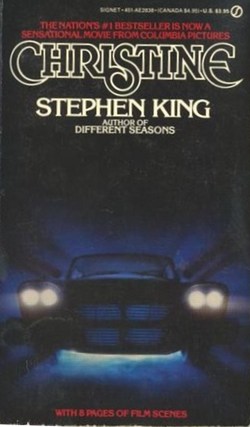 King describes Christine as “Happy Days gone mad,” with Arnie Cunningham standing in for Happy Days’s Richie Cunningham (making Dennis The Fonz), but even King admits that it fell short of his intentions. In the introduction to Four Past Midnight he writes, “When most of the reviews of Christine suggested it was a really dreadful piece of work I came to the reluctant decision that it probably wasn’t as good as I had hoped (that, however, did not stop me from cashing the royalty checks).” This kind of “take the money and run” attitude permeates the entire book right down to the fact that King sold it to the movies before it was even printed. The entire book feels rushed like that, as if King had submitted a first draft full of mistakes, repetitions, and self-indulgences instead of taking the time to clean it up. By this point in his career, some of King’s habits had become affectations, and by the time Christine came along, he had the money and the power to indulge them to the point of lunacy.
King describes Christine as “Happy Days gone mad,” with Arnie Cunningham standing in for Happy Days’s Richie Cunningham (making Dennis The Fonz), but even King admits that it fell short of his intentions. In the introduction to Four Past Midnight he writes, “When most of the reviews of Christine suggested it was a really dreadful piece of work I came to the reluctant decision that it probably wasn’t as good as I had hoped (that, however, did not stop me from cashing the royalty checks).” This kind of “take the money and run” attitude permeates the entire book right down to the fact that King sold it to the movies before it was even printed. The entire book feels rushed like that, as if King had submitted a first draft full of mistakes, repetitions, and self-indulgences instead of taking the time to clean it up. By this point in his career, some of King’s habits had become affectations, and by the time Christine came along, he had the money and the power to indulge them to the point of lunacy.
A prolific quoter of songs, King made sure that each of Christine’s 51 chapters starts with a rock n’roll lyric. The music permissions were so expensive that he had to pay for them himself (to the tune of $15,000) and their copyright info takes up three entire small-print pages. An inveterate over-writer, King takes forever to get Christine anywhere. When Arnie buys the car it takes him four chapters to drive it to the local garage (the most exciting event: he gets a flat tire). After dropping Arnie off at the garage, Dennis goes home and spends an entire chapter chatting with his dad about nothing in particular before going to bed and having a bad dream (there are a LOT of bad dreams in this book).
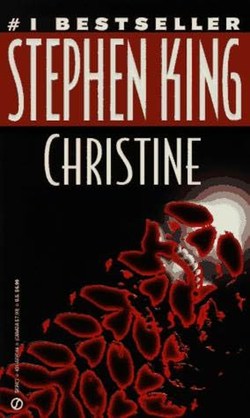 But it’s not just the length, it’s also the inconsistent characterizations. When Arnie has a massive fight with his mom, Regina, we see events through Dennis’s eyes. Over the course of three pages, Dennis describes Regina as aristocratic, then he refers to her as semi-aristocratic, then he says that she’s not aristocratic at all but like the Queen in blue jeans. Dennis claims to like Arnie’s parents, then he mocks them relentlessly and explains that he doesn’t trust Regina because she yelled at him one time and he thinks that she looks down on him, then he suddenly declares that he is in love (!) with her. Dennis repeatedly talks about how great his own mother is, but he has at least three conversations with his dad that revolve solely around mocking her aspirations to be a writer. Number of conversations with his dad in which he mentions why he likes her at all? Zero.
But it’s not just the length, it’s also the inconsistent characterizations. When Arnie has a massive fight with his mom, Regina, we see events through Dennis’s eyes. Over the course of three pages, Dennis describes Regina as aristocratic, then he refers to her as semi-aristocratic, then he says that she’s not aristocratic at all but like the Queen in blue jeans. Dennis claims to like Arnie’s parents, then he mocks them relentlessly and explains that he doesn’t trust Regina because she yelled at him one time and he thinks that she looks down on him, then he suddenly declares that he is in love (!) with her. Dennis repeatedly talks about how great his own mother is, but he has at least three conversations with his dad that revolve solely around mocking her aspirations to be a writer. Number of conversations with his dad in which he mentions why he likes her at all? Zero.
King constantly lards on the cliches. When Dennis talks about how many good times he had with Arnie’s family he reaches for hoary groaners last seen in an episode of Leave it to Beaver, “She looked at me haughtily, as if we’d never laughed together, or baked pies together, or gone on family camp-outs together.” Baked pies together? Leigh Cabot, Arnie’s transfer student girlfriend, is another bland slice of “nice girl,” like Susan Norton in ‘Salem’s Lot. Even the ending is horror cliche so tired that it’s become a punchline. Christine is destroyed, but years later Dennis reads a newspaper story about a Plymouth in California killing someone and he thinks that Christine has returned and is coming for him, working from the West Coast to the East. The End…or is it? Cue dramatic music and a big question mark on the screen.
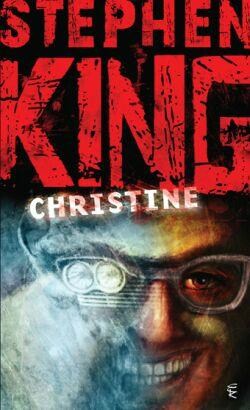 While King has always been happy to go for the gross-out description, he usually doesn’t rely on them quite so much. Here it’s as if he can’t stop himself from wallowing in long descriptions of soft human bodies being turned into road ketchup by Christine. Not content with a few scenes of automotive carnage, he resurrects the ghost of Roland LeBay, the mean old man who sold the car to Arnie then died, for no other reason than to write extended passages about LeBay’s progressive decomposition. As even King admits, LeBay is a nobody, only there because Christine needed to have an owner. Writing him was fun, so King kept writing him. “I couldn’t seem to keep him out of the book. Even after he died he kept coming back for one more curtain call, getting uglier and uglier all the time.” With Carrie, King made it clear in interviews that there were characters who “got out of hand” and had to be trimmed back, but with Christine there was no reason to be disciplined. After all, wasn’t he Stephen King, international bestselling author and literary rock star?
While King has always been happy to go for the gross-out description, he usually doesn’t rely on them quite so much. Here it’s as if he can’t stop himself from wallowing in long descriptions of soft human bodies being turned into road ketchup by Christine. Not content with a few scenes of automotive carnage, he resurrects the ghost of Roland LeBay, the mean old man who sold the car to Arnie then died, for no other reason than to write extended passages about LeBay’s progressive decomposition. As even King admits, LeBay is a nobody, only there because Christine needed to have an owner. Writing him was fun, so King kept writing him. “I couldn’t seem to keep him out of the book. Even after he died he kept coming back for one more curtain call, getting uglier and uglier all the time.” With Carrie, King made it clear in interviews that there were characters who “got out of hand” and had to be trimmed back, but with Christine there was no reason to be disciplined. After all, wasn’t he Stephen King, international bestselling author and literary rock star?
It’s not just King’s indulgence of his own worst tendencies that undermines Christine, it’s his basic execution, which is as sloppy as a pie-eating contest. King tends to think through the backstory of everyone in his books, even down to the mailman in Cujo who appears in two scenes, and has nothing to do with the plot. And yet when the producers of the movie version of Christine called to ask if the car was born bad or became bad later he replied, “I don’t know. You can do whatever you want.” The book is even sloppy on a sentence-by-sentence level, as when Chapter Two starts with the malapropism, “It was a decision I repented very quickly.”
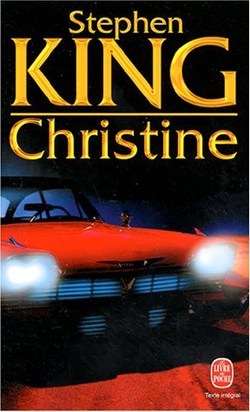 The worst sin of all is the stitched-together, Frankenstein’s monster quality of Christine. The first 166 and the last 121 pages are narrated in first person by Dennis, but then he gets injured and spends a long time in the hospital in traction, leaving the middle 186 pages to be narrated in the third person. It’s jarring, and King says it was an imperfect solution to a writing problem. He says that he found himself stuck when Dennis got injured and had to be removed from action. After trying a bunch of different solutions, he just decided to narrate it in third person. “It almost killed the book,” he later admitted.
The worst sin of all is the stitched-together, Frankenstein’s monster quality of Christine. The first 166 and the last 121 pages are narrated in first person by Dennis, but then he gets injured and spends a long time in the hospital in traction, leaving the middle 186 pages to be narrated in the third person. It’s jarring, and King says it was an imperfect solution to a writing problem. He says that he found himself stuck when Dennis got injured and had to be removed from action. After trying a bunch of different solutions, he just decided to narrate it in third person. “It almost killed the book,” he later admitted.
Some people have claimed that King writes “literary junk food,” which is snobby and dismissive. There is nothing that even remotely resembles junk food in the desperate hunger to be accepted of Carrie, the brutal self-examination of The Shining, the experimentation of The Dead Zone, the resigned exploration of fate and coincidence in Cujo, or the righteous anger and sadness of “The Body.” But Christine is junk food all the way through: super-sized, greasy, messy, and ultimately leaving you empty and unsatisfied. It’s one of the few Stephen King books that is just all wrong, from start to finish.
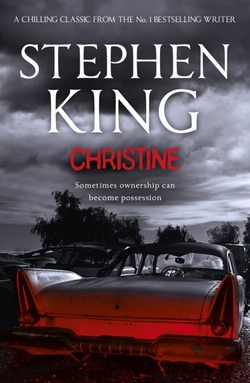 Even the book jacket is wrong. For his author’s photo, King decided to pose with Christine. He rented what he thought was a 1958 Plymouth Fury, but it turned out to be a 1957 Plymouth Savoy instead. Did King make a correction? Nah, there was so much coke to snort, so much beer to drink, so many publication deadlines to meet, and so many checks to cash, that he didn’t seem to care about putting a glaring error on the back cover of his book. That sound you hear? It’s Stephen King laughing all the way to the bank. That other sound? It’s his reputation taking a beating.
Even the book jacket is wrong. For his author’s photo, King decided to pose with Christine. He rented what he thought was a 1958 Plymouth Fury, but it turned out to be a 1957 Plymouth Savoy instead. Did King make a correction? Nah, there was so much coke to snort, so much beer to drink, so many publication deadlines to meet, and so many checks to cash, that he didn’t seem to care about putting a glaring error on the back cover of his book. That sound you hear? It’s Stephen King laughing all the way to the bank. That other sound? It’s his reputation taking a beating.
Grady Hendrix has written about pop culture for magazines ranging from Playboy to World Literature Today. He also writes books! You can follow every little move he makes over at his blog.










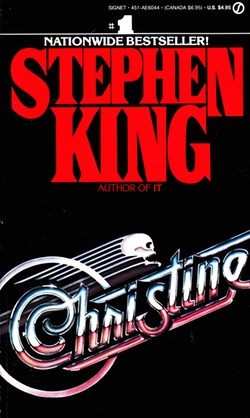
That explains a lot: Stephen King may love cars, but as someone who used to work in both a Car Museum and a bookstore I can tell you that seeing an automotive detail in a Stephen King book always meant to me that it was wrong.
I still remember how he characterized an Olds Toronado as rear-drive in the Dark Half.
This one is really, really even worse than you say. None of the characters are in the least sympathetic, relatable, or human. The entire book is a relentless litany of ugly people doing ugly things. And the explanation of how the car became alive, aware, and sentient just may be the stupidest thing I’ve read this side of Grant Morrison’s “human prejudice was caused by an evil RNA strand” plot.
Bad all around. It doesn’t even have the guilty pleasure fun of some of the other lesser King works, like Firestarter.
This book is truly terrible and yet . . . it holds a dear place in my heart. I read it in junior high and reread it and reread it and reread it. Honestly, I was the perect age and type – a nerd, bad acne, lots of adolescent anger. Everything in “Christine” is ugly as John says and no one comes out on top. I loved it.
Would I love it now? Not if the world is a dcent place, no.
Yeah, I honestly can’t argue with any of the bad things you say about the book here, but I still quite enjoyed it as a teenage nerd (and I can barely change an oil filter). There are still flashes of King’s voice in it, I guess. The revenge subplots are kind of satisfying too.
It may be literary junk food, and we all know junk food is not good for us, but we still eat it and crave it. This book really appealed to me as a 15 year old when I first read it and I still have fond memories of it today. I know McDonalds is not the best thing for me and I know its unhealthy but damn it, sometimes I want a quarter pounder with cheese and a large fry. I guess it is the same with Christine. Its not good literature, but it sometimes hits the spot!
I don’t have much to say on this one as, for some reason, this is the the one Stephen King book that I have not read. I have, however, seen the movie countless times and loved it. Yes, it’s stupid and yes, it’s John Carpenter at his cheesiest. But I just loved how much Arnie loved that car and how much that car loved him, speaking to him in bad 50’s rock songs. Good stuff from a B movie perspective
What’s really remarkable about this work is that, as clunky and half-baked as the novel is, John Carpenter’s movie adaptation is actually pretty good. It’s King’s novel stripped down to only the parts that work with a few changes to make for better continuity, and the young Keith Gordon turns in a genuinely compelling performance as Arnie.
Christine was a favorite of mine to read and re-read when I was about 16, but I don’t think I ever read it straight through till about 2 years ago and… yeah, Grady, you’re spot-on with this review. At least on this read I knew most of the song lyrics quoted. And a lot of those lyrics express King’s concerns and themes much more effectively!
For years I avoided this book due to all the bad reviews. I finally picked it up last year and thoroughly enjoyed it. I am also a big fan of the Carpenter film and was really thrilled by the supernatural elements (however minor) that were in the book and which I did not expect to find. Christine the book is more of a ghost story than the movie is, and the book has many arresting scenes that still play in my head (especially when the forces of paranormal darkness swirl inside the car with Arnie and Dennis). I also didn’t mind the switch to third person. As for the inconsistency of the characters, well, teenagers themselves are very inconsistent, as their habits and morals are still being shaped and molded. Yep. I loved ‘Christine.’
I have a very different appreciation of Christine… I’m french and I read this book in my own langage as a teenager, and LOVED it !!! For the story, at first, but also for all the details about how it was to be a teenager in the USA, the codes, the unspoken rules, Dennis’ reflexions about the gap between parents and children, etc. I am now living in the USA and reread Christine in english not long ago, as an adult… And found everything I liked in it again. It may be not the best book ever written but it’s pleasure, pure excitement. What can be wrong with that? And seeing Christine coming back from time to time in King’s work is always a delight, in The Stand where she’s a life boat or in It where she’s back to her evil self, carrying Henry Bowers to Derry’s Town House… I just love it. So what?
It seems like I’m in the minority with this, but I seriously think that Christine is the Best Book Ever.
Everything is perfect. Not much is said about the characters, but everything is fine-tuned to perfection. We get a few paragraphs of exposition on Dennis and Arnie, no more. But then, their interactions feel organic and rich, and you instantly get a deep understanding of their friendship.
Side characters like Mr. Casey, Sander Galton, Detective Junkins and co. get rich characterization, not by quantity but by quality. Their personalities, character traits, the phrases they use paint a picture of real people. I can’t stress this enough, everyone in this book felt like a living, breathing person for me.
Besides the relative realism, the whole novel has a feeling of uneasiness looming over it. Take for example the issue with Arnie’s parents. In my mind, what you described in the article (the conflicted feelings and descriptions when they are mentioned) shows brilliantly how a mind of a 17 year old not-yet-adult-but not-a-child-anymore person’s mind operates. It’s a brilliant insight into the very process of growing up!
Think about it: of course he likes Arnie’s parents on some level, but since he is not a child now, Dennis discovers more and more flaws in their personalities, in their behavior. Moreover, retrospectively, looking back, he also re-evaluates some past episodes of his childhood. And what I really like about this book is the fact, that almost nothing is spelled out explicitly, everything is just strongly hinted at.
This kind of “show, don’t tell” style of writing that suits King best in Christine when dealing with certain aspects of the story: for example, when Dennis is talking about his mother with his dad: do you really need a paragraph on how he loves his mom? I don’t, since I think it’s far more interesting to read between the lines. Besides, they did not really mock her, I found that they liked and respected her, but you have to read between the lines to see that.
But then, for the vehicular carnage scenes, King switches gears and relentlessly, ruthlessly tells us every little detail about bodies squished/mutilated by the titular car. And this just doubles the intensity of the atmosphere of the book. The looming uneasyness. The realistic changes in Arnie’s personality. The musings of Dennis, which so completely represent the weirdness of the situation and the unsureness in himself, wondering if he’s going crazy. These elements create a perfect mix, a moody atmosphere to fit the scenes of the book. There are unrealistic events in the book, but they are presented in a way that gives us a coherent and consistent experience all throughout the novel.
I could go on and on and on and on about this book, I could praise King for every line, every phrase, every nuance, but I won’t here. I only want to talk about two more things.
One is the narrative break, the switch from 1st person to 3rd person and back again. This is also an aspect of the book that shows how well thought out the whole thing is. The way the three segments weave into each other narratively and from the point of view of the atmosphere and the plot, is just another streak of genius. The characters stay consistent, and there is that weird hint at the end of the book, when Dennis mentions that he doesn’t want to say how he knows the details of events he was not present to witness – again, it’s a magnificient piece of “show, don’t tell”. Not only it does not hurt the book, but it enhances it, and provides new perspectives, just when it was needed the most.
The other thing I want to talk about here is the way King treated this book. Although I think King is the best author in existence, I don’t think he is perfect as a person, so I’m constantly baffled and amazed by how sometimes he does not even understand what exactly makes his certain works so great.
Christine is the perfect example for this, since this is the best book ever written by anyone, and then he says he is not satisfied with it (for the wrong reasons)? OK, who am I to judge this, but the fact about the production of the movie, the fact that he said he does not know if the car is evil from the beginning or not… this is just insanely bizarre and baffling for me, since thinking about the plot logically, only the interpretation where everything stems from LeBay – so the car is NOT evil from the beginning – makes sense, that can be the only valid interpretation. I don’t even get why Carpenter or his writing staff would ask it in the first place. But answering the question as he did, opened the way up to Carpenter to half-ass it and take the easy route, and make that atrociously bad adaptation that completely omits the heart of the book, and hits all the notes spectacularly wrong (like how Dennis and Arnie are reduced to high school jocks, howthe mood and atmosphere isn’t like in the book at all, etc.I).
Sorry for the Wall-of-Text – looks like I need an editor, doesn’t it? – but I had to say this. Christine was an unconscious streak of genius by King, and I think most of his great books are. Every “flaw” in Christine makes sense if you look at the big picture, everything falls into place at the end. I would not delete one letter from this book, it’s perfect as it can be.
I’ve a friend who’s an Artist, she’s studied art, she teaches art, and I’m told her stuff is really good. I’m told this by people I trust, because really, I don’t know my arts from my elbow.
We once went to an presentation of paintings by a mutual friends wife. I really liked the pictures and said so, my artist friend leaned in to me, and explained why the picture we were looking at was actually a hot mess. She could see what was wrong with it, because she knew what she was looking at.
As a teenager I adored Stephen King, I loved his books, they were excellent. Then, after college and after I’d been working for a couple of years, I read me some books about writing, about story structure, how to spot themes and how to weave them into your writing. This knowledge ruined Stephen King for me.
Like my artist friend, I now know more about what I’m seeing when I read, I can spot a hot mess when I see one, and so much of kings “beer and coke” books are messy and undisiplined.
I loved Christine when I was a kid. I also loved my maths teacher, The Man From Atlantis and the original Battlestar Galactica … but to be fair I don’t cringe when I think of Christine, they others? Serious cringe fest!
Everyone over analyzes everything in life … just read the book and try to imagine your right there seeing everything. The only complaint I have is things like when King calls a camaro a Ford and says put the gearshift lever in gear (the car has a push button transmission). That’s the details that make me reread a paragraph to make sure I wasn’t crazy, that’s my gripe. But overall I love the book and the movie both. Read open mindedly people … you may find that you might actually enjoy something.
Sadly, it seems that the lyric rights King paid for have lapsed. The recent Gallery Books edition has omits them.
Cool
I can’t help but add a “ditto” to the comments by others who read the book first as teenagers and loved it. I’ve been a rabid Stephen King fan since I was way too young to be reading books like his, and—although it is far from perfect—I love Christine. I’m really not bothered by most of Grady Hendrix’s criticisms, but I admit maybe that’s because King can’t do much wrong in my view with his earlier work. (I’ve struggled with his post-accident novels.) I liked the familiar tone and turns of phrase in Christine.
Like others above, I think I might have been a good age to read a book about high-school buddies. But I’m also well educated and a voracious reader of all types of fiction and nonfiction, and I thought/think Christine is a great book.
OK, I do have two beefs with it. One is the scene where the group of bullies smashes Christine to smithereens, and as a final heinous insult, one of them takes a $h!t on the dashboard. I found it hard to believe that even a drunken bully a) could poop on demand and b) would do it in front of all his friends. I dunno. I couldn’t do it.
One is the scene where the group of bullies smashes Christine to smithereens, and as a final heinous insult, one of them takes a $h!t on the dashboard. I found it hard to believe that even a drunken bully a) could poop on demand and b) would do it in front of all his friends. I dunno. I couldn’t do it. 
The second is the scene where Christine tries to kill Leigh while they’re sitting at (I think) McDonald’s, and after she recovers, Leigh tells Arnie, “Cars are girls.” Whaaat? To me, that sounded like a bell clanging way out of tune.
Those things aside, I really loved Christine—despite her unending fury…
Just finished this one and it was a lot of dumb, B-movie fun.
‘The book is even sloppy on a sentence-by-sentence level, as when Chapter Two starts with the malapropism, “It was a decision I repented very quickly.”’
You didn’t explain what is wrong with this. Indeed, are you even using ‘malapropism’ correctly?
I could not disagree more with this review. Christine is my favorite of Stephen King’s books and though it certainly has its faults I don’t think it deserves such a harsh review. (In my opinion, it’s The Stand that does.) I can accept that you did not like it but your analysis of parts of it such as Dennis’ characterization of Regina shows that you weren’t paying close enough attention. Many times Stephen King displays an amazing talent for getting to the heart of painful matters and really examining a person’s soul. He does so here with his characterization of Arnie as a loser and outsider. Sometimes I find myself asking “HOW does Stephen King KNOW?” Anyway, I loved this book and I’m sorry Stephen King doesn’t. It will always hold a very special place in my heart and I am forever grateful to Stephen King for such an amazing gift.